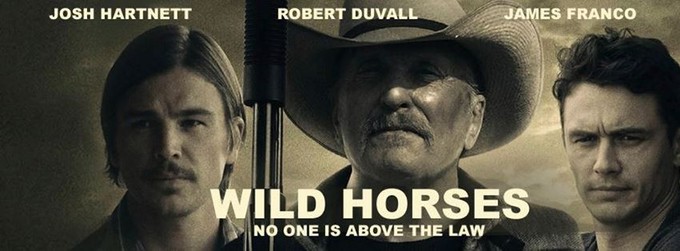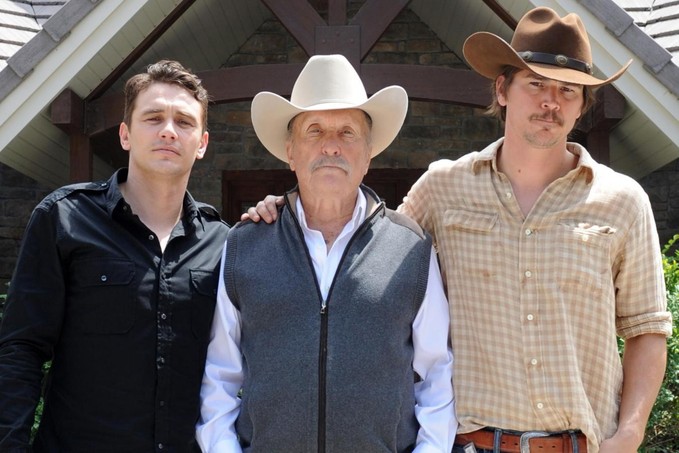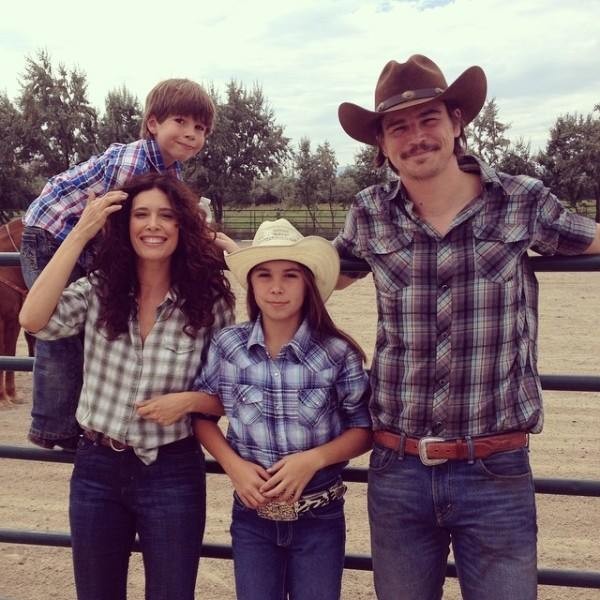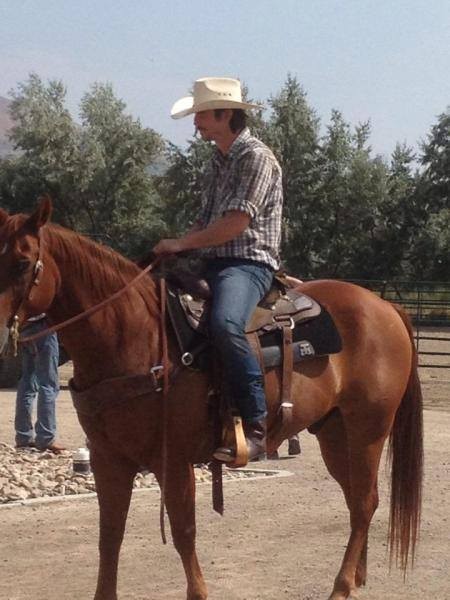The premiere fan-managed social network for Josh! Founded December 26, 1998
SXSW '15: Vinyard gets a chance to ask Robert Duvall, Josh Hartnett, and Luciana Duvall about WILD HORSES!

As you may imagine, it’s a little intense to talk to Robert Duvall.
I mean the man started out as Boo Radley in TO KILL A MOCKINGBIRD, for chrissakes. He served as consigliere to both Vito and Michael Corleone. “I love the smell of napalm in the morning.” M.A.S.H., TRUE GRIT, THX 1138, NETWORK, THE SEVEN-PER-CENT SOLUTION, THE NATURAL, FALLING DOWN, and so on. The man’s a piece of movie history in and of himself.
He’s directed five movies since 1977, including 1997’s Oscar-nominated THE APOSTLE, and his latest just premiered at SXSW. WILD HORSES tells the story of Scott Briggs (Duvall), an aging rancher ready to pass down his 100,000 acres of Texas land to his children (including Josh Hartnett and James Franco) when a decades-old murder resurfaces and threatens to put everything in jeopardy. A Texas Ranger (played by Luciana Duvall, Robert’s wife) prods the family looking for evidence, and secrets keep pouring out that make a graceful twilight for Briggs all but impossible. It’s an elegant, arch tale with a few well-executed surprises, and strong performances by Franco, Hartnett, and Mr. and Mrs. Duvall.
For most of my interview with Duvall, Luciana, and Hartnett, I just sat back and listened to the master and his co-stars talk about their approach to their roles, the difficulties of shooting an indie film with a three-week schedule, and what it was like to work with the Academy Award-winning actor/director.

VINYARD: I just wanted to get started talking about each of your characters. I guess we’ll start with you, Josh.
DUVALL: Josh is a good guy. He did a good job. And he’s pretty articulate.
HARTNETT: Now the pressure’s on. Robert should tell you the whole story, but from my character’s perspective, I’m the middle brother of three sons who grew up with a strong, patriarchal figure who owns a ranch and has accrued quite a bit of wealth in this county, and therefore has a lot of leeway to be autonomous in this place. My character was sort of passed over at a young age by the youngest brother, who was, in a way, dad’s favorite. Then something happens between him and Bobby’s character, our dad, and he goes away. So I’m kind of left there to pick up the pieces, to be the heir apparent, to kind of take up the reigns of being the favorite son. It’s a sort of ill-fitting suit, but at the same time, he loves his father, and he wants to help him grow the business, but there’s a bit of a chip on his shoulder. At the same time, he’s dealing with a lot of problems with his own wife and his own kid, so he’s moved back home and is actually living with his dad. That’s it for my character.
VINYARD: It seems like the plot has vaguely Shakespearean elements.
DUVALL: I never thought of it. Never thought of it that way.
HARTNETT: But I’ve been saying that all morning!
DUVALL: It’s just in everyday terms, you know. People you know, and knew, and think of knowing. The English have Shakespeare, we have the western. That’s the way I look at it. But you know, whatever. Human, human, human, people, humanity.
VINYARD: How did you come at the role of this sort of shady patriarch?
DUVALL: I kind of inherited the script, which was very meager. We worked on it, and tried to find a guy with a past, but he’s represented well in the present. He’s well-respected in his community, but he’s done something in his past and he’s trying to forget about it. It haunts him, not in an everyday literal way, but it eventually catches up to him. It might be a crime but it’s not necessarily a crime, and this Texas Ranger comes in to try and solve something that he’s been sitting on for years that he’s hiding. He’s a guy that does well in the community, but like everybody, he has his faults. He’s at the end of his life, and knows that he has to get it off his chest possibly.
HARTNETT: There are elements that are also dreamlike. When I read the script I didn’t know, because I hadn’t been involved in development, so I didn’t know what to expect. When I read it, it felt like the scenes were flowing together in an almost stream-of-consciousness state. A dream state.
DUVALL: That’s a good way of putting it, yeah.
HARTNETT: It felt to me like it was the man recounting his life at the end of his life. These sort of last moments of his life are a sort of dream, and he seems to be aware of his own demise, so he’s trying to set things right. It felt like something more poetic than literal.
DUVALL: Also, when I’d got the original story, the guy had said, “I didn’t know what to do with your character, so I wanted to make him ill.” So the first draft, he said “I had you in bed the whole movie.” And I said, “That’s not gonna happen!” I think it’s an impressionistic kind of thing. Just a tale, and a story that unfolds. Not hitting you with each point, but just kind of there. That’s kind of the way we wanted to do it, you know? If it was a TV series, you could really go into character’s backgrounds. We had a lovely scene with my daughter on the porch of her ranchhouse, but we had to cut it out, we just didn’t have time. An hour-and-45. The powers that be wanted to make it an hour-and-30, cut everything out, I said, “Well, if you do that, I’m off the movie. If we can’t have two hours, we’ll have an hour-45. Let us keep the Rangers, let us keep the important components.” It feels good. We had a wonderful guy from England who did the music. You know the movie that won the Academy Award?
LUCIANA: THE THEORY OF EVERYTHING.
DUVALL: The music was too much! They just pump music in. I always thought they put too much music in the movies. You see a wonderul Iranian movie, there’s hardly any music. This guy’s very sparse with the music. And these new sounds, these things they have with sound design. The old cliche: less is more. We put it together, put some music on it. Billy Joe Shaver, the wonderful singer from Waco, he has a song. When I did the movie with Jeff Bridges, I sang a Billy Joe Shaver song at the end, opened my mouth, $40,000 it cost us. Now for $2,000 he’s let us have a beautiful song to put over the credits. Everybody added to it. 23 days is tough when you get down there. It was hard to find the proper ranch up in Utah, we finally did.
HARTNETT: It looked great
DUVALL: Yeah, beautiful ranch. (The owner) screwed us, she tried to screw us.
HARTNETT: Really?
DUVALL: Oh, yeah, we knew that was comin’! Anyway, Skull Valley looks a lot like West Texas, and we had to film a river crossing. So Hank Whitman, who’s a real Ranger, e-mailed or texted back to the guy, some real Ranger in Rio Grande City, like “Which part of the Rio Grande is this?” “Rio Grande City, Texas?” “No, it’s Utah.” So we found good approximations for Texas. Very good crew, great to work in Utah, cheaper. Great place to work.
HARTNETT: Name of the game in independent film, getting more for less.
DUVALL: Exactly.
LUCIANA: You were very good at that.
DUVALL: It’s the kind of movie that would probably never get made in Hollywood. But even the movie I did, THE APOSTLE, got a letter from Brando, “Loved it!” And Billy Graham loved it. So I got it from the secular and I got it from the religious. If we’d done that in Hollywood, I woulda got paid a lot of money, and they wouldn’t have done it right. They would’ve patronized the subject. Like Horton Foote said, the great Texas playwright, “Many New Yorkers don’t know what goes on beyond the South Jersey Shore.” And that’s true for the west-east, you know what I’m saying? A lot of times the people from the city don’t know what’s out there, so it’s a patronizing procedure looking at certain rich, cultural things in America. With all our faults, which we have many, we still have many rich things in America, culturally. We just tried to touch on something here. Anything you can concoct in your imagination happens somewhere, I think. So if we concocted something that’s imaginary, here with the family, it has to have happened somewhere. An approximation, at least. We had a wonderful cast. We were fortunate to get such a wonderful cast for such a low budget. Pay them a little per diem, that’s about it. Good food, actually.
HARTNETT: Which is the most important thing, actually.
DUVALL: It was interesting working there. We only had 22 days. I had to do publicity for THE JUDGE up in Toronto, so they were like, “You have to finish.” And we were like “We can’t finish! You told us this, this, and this.” So Warner Bros. picked up the bill for us to work on Labor day, they paid the bill, so it was great! When we did the car chase and everything, it was great. (to Luciana) She played a lady Ranger. I wanted to keep that in when I took over the script. That, the lady Ranger, and the disappearing son. That’s interesting, the lady Ranger, ‘cause there’s only two or three.

VINYARD: What was it like playing a Texas Ranger?
LUCIANA: Intimidating. Just like saying, “Oh yeah, I’m playing a Navy SEAL.” It took me a while to tell people. When Bobby brought it up, I was just like, “Hmm, can we keep it quiet?” And still, it’s very intimidating. As you know, Texas Rangers have this myth, this legend of who they were, how they started. They used to be civil soldiers in the early days of Texas, and they were these wild men.
DUVALL: They were wild men!
LUCIANA: Wild, wild as they can be. And they were very eccentric. They were very Anglo-Saxon.
DUVALL: They said when the Anglo-Saxons came to Texas, they’d never seen anything like it. Tough, tough.
LUCIANA: These men were able to really handle the Comanches, so they were conquering other tribes, and they were very powerful, as you know.
DUVALL: They made the Apache go into monasteries, they were that powerful.
LUCIANA: So with that in mind, and the history they had, how they evolved to this modern technology they use is very sophisticated, with all their equipment. But we tried to keep my character very simple. More like in the old-fashioned way.
DUVALL: Can’t be bought, can’t be bought.
LUCIANA: The story is not about the typical case of, “We’re going to investigate, and we’re going to show you the technology that is out there.” I think my character allows his family to display who they are, the complexities of who they are, how they interact with each other.
DUVALL: You catch me on quick tricks, *snaps* quick tricks.
LUCIANA: That was the idea. To see what it would be if you go on holiday for four days with a family that you don’t know much about that you think you know who they are, and what people tell you, that they’re good guys, you buy that image. That happens to many of us. Until somebody comes around, or you get the flash of something that they said, and the days you start spending with them, you go like, “Are we sure what people are telling you, or is it me that got it wrong?” And I think when you see the film, you get to know his character, the interactions of his family, and that people are complex. People have contradictions, people are capable of doing something extremely wonderful and sincere, and controlling at the same time. And they’re capable of the other side. And I think that’s the challenge of my character. Not so much for her, as much as rooting for the family, and those who know the main character.
That’s one thing I found fascinating in my research. You find a woman who looks very innocent, mother of two, who’s incapable of killing her husband, so her argument is that it was in self-defense. Which sometimes it is. But if you continue to question these people, and you research what they do when nobody’s home, most likely the woman was on the internet, having sexual talks with the neighbor, spending the husband’s money. If you don’t know this woman, and you bump into her in the supermarket, you wouldn’t know. It’s the image we want to create of people that I find really fascinating in my personal life and experience.
HARTNETT: And getting past that.
LUCIANA: And I think my training as a law enforcement officer allows me to know that this guy’s lying.
DUVALL: She did a lot. She got a blue belt in Jujitsu. She did a lot of training. Not that it’s in the part, necessarily, but it’s sitting there within the actress to call upon if needed. But that’s not what was called upon.
LUCIANA: And you see with Josh’s character, I don’t know if you agree Josh, butI thought it was very interesting about Josh’s character…in psychology we call it patterns behavior. There will be one child of the family who will emulate their parents exactly, the sound of their voice, their behavior, whatever it is. And Josh, I think, is that character in the film. He acquires as much as he can of his father’s. But also he has contradictions. You will see his darling, this wonderful horse, but he’s extremely loving to his children. He has a tenderness, and the ability to tame a horse that maybe the other children will have. So if I’m a visitor, I see his character as being so loving, but then I tell you he’s capable of bullying a Texas Ranger, and you say, “No, not from what I’ve seen!” That’s always been very interesting to me, the contradictions of people. Can you judge someone, or do you need to get to know them?

VINYARD: So the title is literal, obviously, because there are actual wild horses involved.
DUVALL: We just grabbed the title. We didn’t know what to call it, so we said we’d call it WILD HORSES. There’s a thing I wanted to use, GROWN MEN DO STRANGE THINGS, but that’s too long. Grown men do do strange things. That’s a line in the movie.
LUCIANA: I grew up riding. I don’t know what your experience is, Josh, riding a horse, but you’re never sure. You fall in love with horses, you know they’re beautiful, you dream, you have this romantic idea, but in no time you can be on the floor, you can be very hurt. I think people can do that to you.
DUVALL: A horse doesn’t love you like a dog does.
LUCIANA: But there’s this idea again that we have of things of what we want them to be, then we realize that we missed all the signals of the horse. Maybe it wasn’t as friendly as when you walked in. There are very subtle things when you approach a horse that tell you, “Mmm, I don’t think this horse is for you.” And I think with people it’s the same thing. Then you go back in time, and you hear people saying, “Yeah, they told me that person did that, but I wasn’t sure because my experience was so different.”
HARTNETT: That’s why we’re so reluctant to convict celebrities of crimes. “But he was such a good running back! He couldn’t possibly…did you see him in NAKED GUN?!”
VINYARD: What was it like working for your husband?
LUCIANA: It was a thrill. I’m not an actress, but-
DUVALL: She’s tough to direct, but that’s okay. I knew that going in.
LUCIANA: I just find it fascinating when someone like Bob or like Josh can step into that fictional world, and they create something very magical. It’s like they tap into something…I can’t explain what it is, and I find it very fascinating to have that interaction with these people when they are in that zone. Like with an athlete when they’re in the zone. THere’s a very special moment you experience when you’re in the zone.
DUVALL: The zone is trying to approximate life as close as possible. Brando used to watch CANDID CAMERA, that was what he founded interesting. Pure behavior. That worked for him.
HARTNETT: Now we have Youtube. You can watch anything. I think basically what Luciana’s referring to is basically actors have a screw loose. We’re able to slip between reality and fiction very quickly.
LUCIANA: I think it’s fascinating!
HARTNETT: Let me just say real quick that being able to work for Robert Duvall was an absolute dream come true. I never expected anything like that to happen. I got a call, I was on vacation with my girlfriend in Italy.
DUVALL: We talked about food.
HARTNETT: We basically only talked about food the whole time we knew each other! But I get a call asking if I would be in the film, and I’m like, “Yeah, of course I will. What can I do?” Then getting on set and getting to watch him work- he did more work than anybody else on the production by far.
DUVALL: But I’m considered to be passive at times. Which is okay! Sit back and waste some film to see what they do! And they say “Well, do something,” and I say, “What do you mean? I’ll just sit here, let’s see what happens.”
HARTNETT: There was actually a time you told me at the dinner table, “Say something, Josh!” Because we were shooting me, and everyone was talking around, and Rooster (McConaughey) did his thing, and James did something, and I was just supposed to say something. And I came up with who knows what.
DUVALL: His sister had a wonderful, emotional moment but the camera wasn’t on me. We had a camera on Steadicam on sticks in the wrong place.
HARTNETT: All of my best work is done off camera. Do we still have the scene in the bedroom?
DUVALL: No.
HARTNETT: That’s out?!
DUVALL: That’s out.
HARTNETT: I love that scene.
DUVALL: It was too long. It was okay, it was nice, but it was so long.
http://www.aintitcool.com/node/70814?utm_source=full-feed&utm_m...
Views: 238
Comment
© 2024 Created by Christopher Matthew Spencer.
Powered by
![]()
You need to be a member of Absolute Josh Hartnett to add comments!
Join Absolute Josh Hartnett